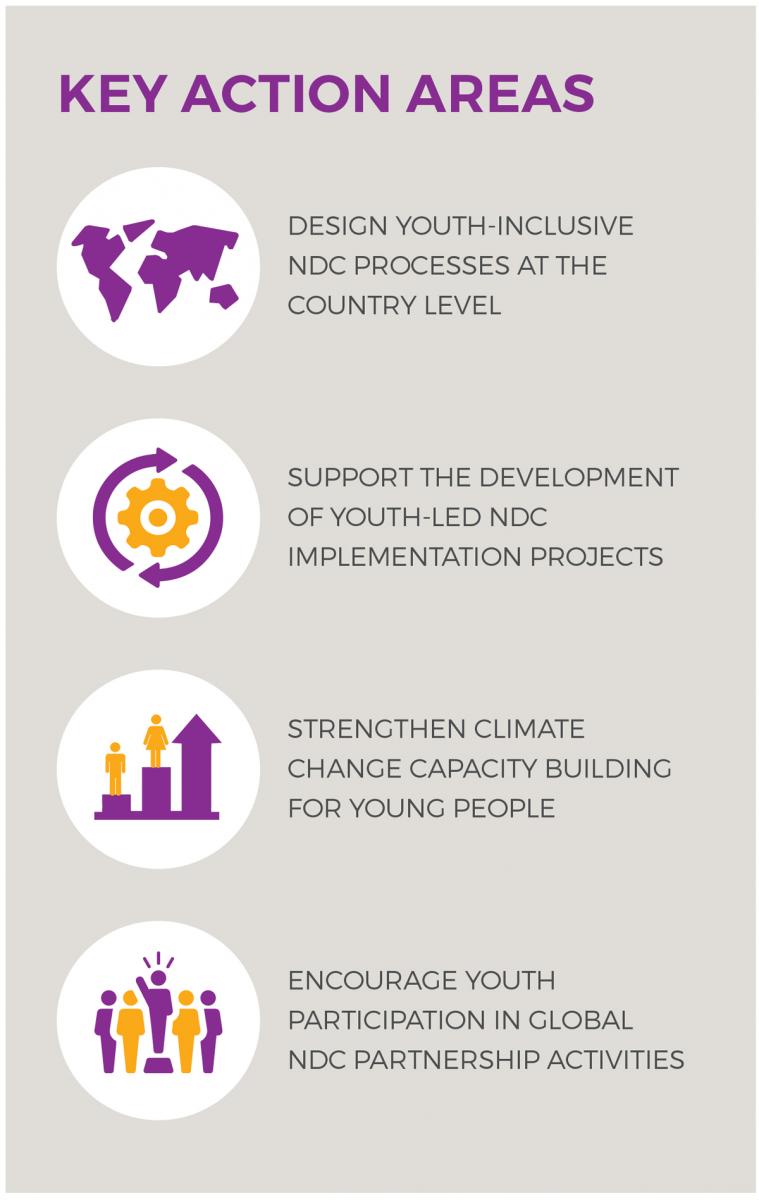
https://ndcpartnership.org/news/roadmap-meaningful-youth-engagement-ndcs
The YEP is a youth-led and member-informed roadmap for NDC Partnership member countries and institutions to meaningfully include youth in NDC development, enhancement, and implementation. The plan was developed by a Youth Task Force, consisting of youth representatives from nine countries and institutions, that consulted more than 500 young people representing more than 80 countries. The consultations were complemented by insights from nearly 50 Partnership members through a survey, workshops, and interviews.
The YEP outlines four key action areas: designing youth-inclusive NDC processes at the national level, supporting the development of youth-led NDC implementation projects, strengthening climate change capacity building for young people, and encouraging youth participation in global NDC Partnership activities.

The YEP provides specific guidance and suggestions, such as encouraging private-public scholarships for climate-change related studies, allowing youth organizations to become a member of the Partnership, and including youth as key stakeholders in climate action. The consultation process surfaced a series of best practices that are captured in a supplementary resources document. The Partnership also created a Youth Topic Page to feature stories, tools, and guidance for members seeking to learn more about youth engagement. The NDC Partnership will organize an annual Youth Engagement Forum to create a space for youth to provide inputs on NDC Partnership priority topics.
The Support Unit and Youth Task Force will host a series of webinars for youth and decision-makers to learn more about the key action areas and best practices identified through our consultation process. The webinars provide an opportunity to dive deeper into the recommendations of the YEP and discuss youth engagement best practices directly with those implementing them on the ground. If you are interested in participating, please take a look at the webinars below and sign up.
Youth Engagement in Climate Action: A Conversation (Target audience: youth)
-
Tuesday 26 January 21:00-22:00 EST | 9:00-10:00 ICT | 11:00-12:00 JST | 14:00-15:00 MHT | Registration: https://ndcpartnership.org/events/youth-engagement-climate-action-conversation
-
Thursday 28 January 9:00-10:00 EST | 15:00-16:00 CET | 17:00-18:00 EAT | Registration: https://ndcpartnership.org/events/youth-engagement-climate-action-conversation-0
Youth Engagement Best Practices Discussion (Target audience: NDC Partnership Members, decision-makers)
-
Tuesday 2 February 9:00-10:00 EST | 15:00-16:00 CET | 17:00-18:00 EAT | Registration: https://ndcpartnership.org/events/youth-engagement-best-practices-discussion
-
Thursday 3 February 21:00-22:00 EST | 9:00-10:00 ICT | 11:00-12:00 JST | 14:00-15:00 MHT | Registration:
-
https://ndcpartnership.org/events/youth-engagement-best-practices-discussion-0
-
ABOUT US
Through our Partnership, members leverage their resources and expertise to provide countries with the tools they need to implement their NDCs and combat climate change to build a better future.
In 2015, the world endorsed the Paris Agreement and the 2030 Agenda for Sustainable Development. These historic accords presented countries with an unprecedented opportunity to align the climate and sustainable development agendas to spur economic growth and improve the livelihoods of all people. Nations signal their commitments to the Paris Agreement through Nationally Determined Contributions (or NDCs) - each country's strategy to cut its own greenhouse gas emissions and build resiliency against the negative effects of a changing climate.
Countries will revise their NDCs every five years to become more ambitious to limit Earth's temperature rise and adapt to its impacts. Through our Partnership, members leverage their resources and expertise to provide countries with the tools they need to implement their NDCs and combat climate change to build a better future.












Add new comment